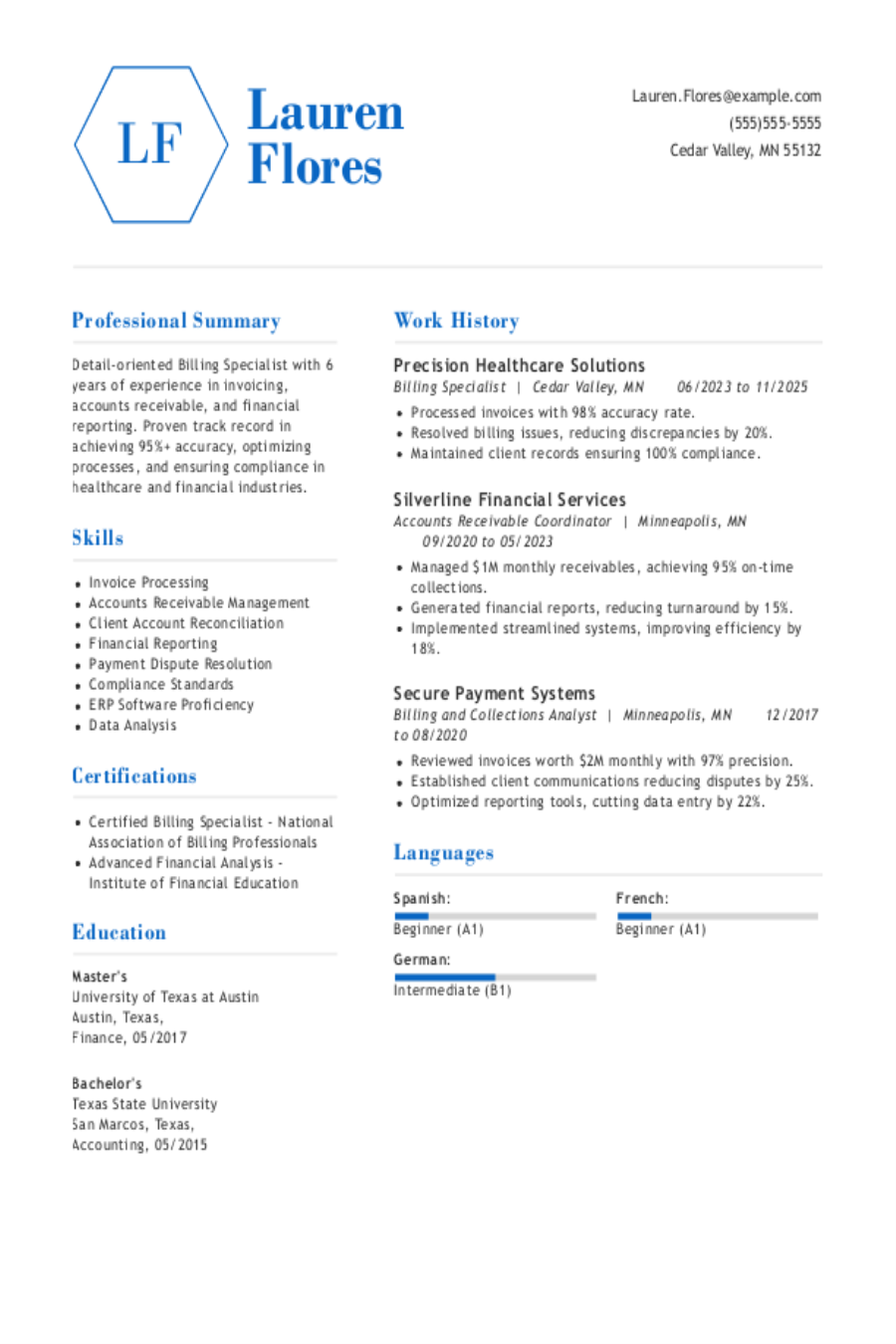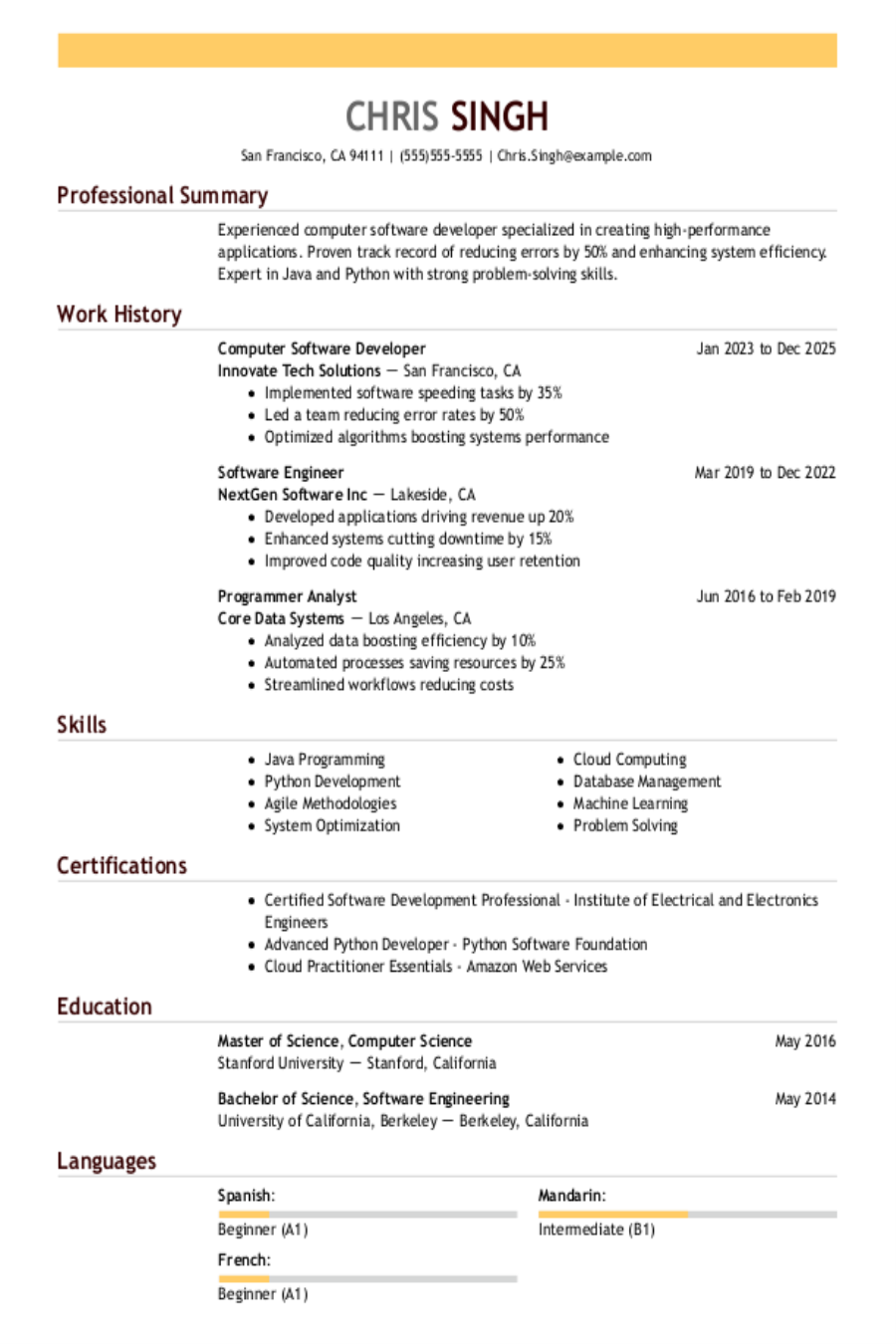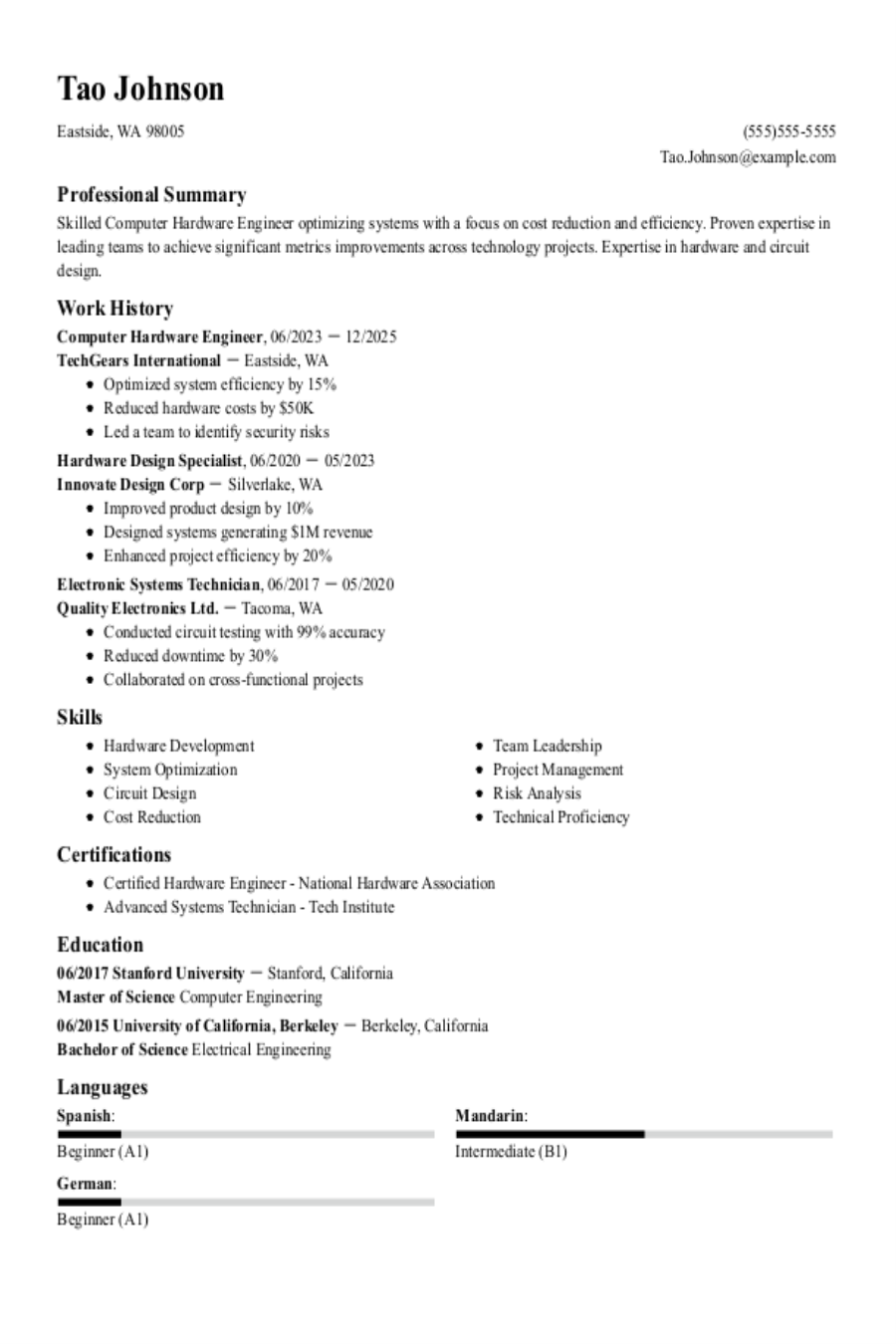Popular Farmer Resume Examples
Entry-level farmer resume
An entry-level resume for a farmer should emphasize relevant agricultural skills, hands-on experience gained through internships or volunteer work, and knowledge of sustainable practices to show readiness for the role.
Emphasis on soft skills: This explanation highlights how the job seeker's strong soft skills, including leadership and innovative problem-solving, boost productivity. This is demonstrated by their 20% yield growth at Harvest Valley Farms, effectively compensating for limited direct farming experience.
Clarity: Choosing a simple resume template allows recruiters to quickly grasp your qualifications, showcasing your strengths effectively without distractions.
Mid-career farmer resume
A mid-career farmer's resume should emphasize a strong combination of hands-on agricultural experience, technical skills in farming practices, and evidence of sustainable growth and innovation in their operations.
Powerful resume profile: A well-crafted resume profile highlights the farmer's experience in increasing productivity and implementing sustainable practices. This clarity helps recruiters and ATS identify relevant qualifications quickly, ensuring a strong first impression.
Emphasis on experience and skills: This farmer's resume showcases a strong balance of technical skills in crop management and sustainable practices, alongside clear career progression from farm assistant to leading operations, illustrating a commitment to professional growth.
Experienced farmer resume
An experienced farmer's resume should prioritize showcasing hands-on skills, crop management expertise, and quantifiable achievements in yield improvements to effectively illustrate their career growth and contributions to agricultural practices.
Numerical data: Quantifiable achievements, such as a 25% increase in crop yield or a $50,000 annual cost reduction, make the job seeker's contributions tangible and easily understood by recruiters. These specific metrics improve credibility and clearly demonstrate the impact of their work in agriculture.
Organized template: The resume uses a clean and structured template that combines a professional header with an ats-friendly resume design, ensuring it appeals to both hiring managers and automated applicant tracking systems.
No experience farmer resume
A resume for an applicant with no experience should emphasize relevant skills like teamwork, adaptability, and any agricultural coursework or volunteer work that shows dedication to the field and eagerness to learn.
Emphasis on professional skills: By emphasizing skills in sustainable farming and community outreach, the applicant demonstrates a strong readiness for the farmer role, despite limited hands-on experience in agriculture.
Relevant coursework: Highlighting relevant coursework in agricultural science and environmental studies illustrates the applicant's strong foundation in farming principles, effectively showcasing job-specific knowledge despite limited hands-on experience.
Farmer Resume Template
Kickstart your career in agriculture with this farmer resume template. Tailor it to reflect your unique skills and experiences in the farming industry for a standout application.
John Singh
Miami, FL 33102
(555)555-5555
John.Singh@example.com
Professional Summary
Experienced farmer with expertise in sustainable agriculture and crop management, driving efficiencies and increasing yields through innovative solutions.
Work History
Farmer
Harvest Acres Farm - Miami, FL
June 2022 - August 2025
- Increased crop yield by 15% using precise irrigation
- Implemented sustainable farming reducing costs by 20%
- Managed livestock resulting in 25% health improvement
Agricultural Technician
AgriTech Solutions - Tampa, FL
August 2016 - May 2022
- Optimized pest control, reducing expenses by 30%
- Designed irrigation systems boosting yield by 20%
- Conducted crop analysis resulting in 10% gain
Farm Assistant
Prairie Farms Inc. - Tampa, FL
September 2014 - July 2016
- Assisted in crop rotation improving soil quality 15%
- Maintained farm equipment ensuring 25% efficiency
- Supported harvest operations increasing productivity 10%
Education
Master of Science Agronomy
University of Iowa Iowa City, Iowa
May 2012
Bachelor of Science Agricultural Science
Iowa State University Ames, Iowa
May 2010
Skills
- Sustainable Farming
- Crop Management
- Livestock Care
- Pest Control
- Irrigation Systems
- Soil Analysis
- Agricultural Automation
- Data-Driven Decision Making
Certifications
- Certified Crop Advisor - Agronomy Association
- Organic Farming Certificate - Green Farming Institute
Languages
- Spanish - Beginner (A1)
- French - Beginner (A1)
- German - Beginner (A1)
Must-Have Skills on a Farmer Resume
A robust skills section is important for making your resume stand out in a competitive job market.
Skilled trade professionals bring practical expertise and reliability to essential tasks. The skills you highlight should reflect your ability to perform consistently and support quality work. Your resume allows you to show how you contribute to durable results and the smooth functioning of vital operations.
The following data highlights the most sought-after hard and soft skills for a farmer, based on insights from agricultural industry reports.
When you’re ready to improve your resume with relevant skills, try using AI Resume Skills Generator. This tool offers tailored suggestions for both hard and soft skills based on your job title, ensuring your skill set aligns with industry expectations.
Writing Your Farmer Resume
Having explored various resume examples, you’re now well-equipped to dive into the process of creating your own. In this guide, we’ll walk you through how to write a resume step by step, detailing each section for clarity and effectiveness.
List your most relevant skills
Crafting an effective skills section for your farmer resume is important to highlight your qualifications and readiness for the role. This section should reflect both your technical expertise—such as crop management, soil health, and machinery operation—and essential soft skills like teamwork and adaptability. By focusing on these areas, you show prospective employers that you possess the necessary capabilities to thrive in a farming environment.
To improve your chances of standing out, make sure to incorporate keywords from the job listing into your skills section. These keywords not only resonate with human recruiters but also help applicant tracking systems identify you as a strong applicant. Tailoring this section to mirror the language used in job descriptions demonstrates that you are aligned with what the employer is seeking, ultimately improving your visibility in the hiring process.
Example of skills on a farmer resume
- Proficient in operating various agricultural machinery and equipment
- Knowledgeable in crop rotation and soil management techniques
- Strong communicator with the ability to collaborate effectively with team members
- Adaptable problem-solver capable of working under varying weather conditions
When crafting your resume, don't overlook the value of soft skills. Employers treasure interpersonal abilities because they are not easily taught. Highlighting these attributes can set you apart and demonstrate your potential to thrive in a collaborative environment.
Highlight your work history
Your work experience section is a key part of your farmer resume. It’s important to highlight achievements and show how you've applied your skills in practical farming scenarios. Demonstrating specific accomplishments, such as increased crop yields or effective livestock management, can help differentiate you and illustrate the value you bring to farm operations.
For each entry in your work history, include details like your job title, the name of the farm or employer, and the dates of employment. Including this information builds credibility with employers who want a clear understanding of where you’ve worked and for how long. Providing context about your background helps them assess your expertise in agriculture.
Example of a farmer work experience entry
- Farmer
Green Valley Farms - Sunnydale, CA
March 2018 - Present - Cultivate and harvest a variety of crops on 150 acres of farmland, achieving an average yield increase of 20% year-over-year through innovative farming techniques
- Implement sustainable agricultural practices that reduced water usage by 30% while improving soil health and crop quality
- Manage daily operations including planting, irrigation, pest control, and harvesting, ensuring timely completion of all tasks to meet market demands
- Train and supervise a team of 10 seasonal workers on equipment operation and safety protocols, leading to a 15% reduction in workplace incidents
- Develop strong relationships with local markets and distributors, boosting sales revenue by establishing new contracts that increased profitability by 25%
When crafting your resume bullet points, aim for clarity by including specific achievements while keeping it concise. Focus on strong outcomes and use active language to convey your contributions effectively without unnecessary details.
Include your education
The education section of your farmer resume should be organized in reverse-chronological order, starting with your most recent qualifications. This can include degrees related to agriculture, certifications in farming techniques, or any specialized training relevant to the field. If you have attained a higher degree, there’s no need to list your high school diploma or associate degree.
For those who are currently enrolled in educational programs or have incomplete studies, it is beneficial to indicate your highest completed level and provide an expected graduation date. Additionally, consider including bullet points that highlight relevant coursework or practical experiences that pertain directly to farming practices. This is particularly helpful for new graduates who may not yet have extensive work experience.
Common certifications for a farmer resume
- Certified Crop Adviser (CCA) – American Society of Agronomy
- Certified Organic Farmer (COF) – Organic Farmers Association
- Pesticide Applicator License – State Department of Agriculture
- Farm Management Certificate – University Extension Programs
Sum up your resume with an introduction
Your resume profile serves as a crucial gateway to your professional story, immediately showcasing your most relevant qualifications to potential employers. This introductory section can influence whether hiring managers are compelled to learn more about your background.
The decision between a professional summary and resume objective should align with your career experience. Seasoned professionals can use professional summaries to emphasize concrete accomplishments and industry expertise. Those starting their careers or switching fields will find resume objectives more suitable for highlighting relevant education and clear professional aspirations.
Professional summary example
Innovative farmer with over 10 years of expertise in sustainable agriculture and crop management. Demonstrated success in boosting yield efficiency and improving soil health through advanced farming techniques and precision technology. Highly proficient in organic cultivation, irrigation systems, and livestock care, consistently achieving optimal production outcomes while promoting environmental stewardship.
Resume objective example
Enthusiastic farmer eager to apply my passion for sustainable agriculture and hands-on experience with crop management to support a thriving farming operation. Committed to using strong problem-solving abilities and teamwork skills to improve production efficiency and promote environmental stewardship in the field.
As a farmer, your resume profile is important for making a strong first impression. Make sure to review job descriptions closely and weave in relevant keywords that reflect your skills and experiences. This strategy not only improves readability but also increases the chances of passing through applicant tracking systems (ATS) used by employers to filter job seekers.
Add unique sections to set you apart
Optional resume sections are a great way for you to highlight your unique qualifications as a farmer. By including these areas, you can showcase not just your agricultural skills but also the diverse experiences that set you apart from other applicants.
Incorporating sections about relevant hobbies or volunteer work can offer insight into your personal values and commitment to the farming community. Perhaps you’ve spent weekends volunteering at local farm-to-table initiatives or have participated in environmental conservation efforts. These details not only illustrate your dedication to sustainable practices but also reflect skills such as teamwork and leadership that employers value in the agricultural field.
Three sections perfect for a farmer resume
- Technical skills: Technical skills are important for farmers as they demonstrate expertise in modern agricultural practices. Including them on your resume showcases your ability to use technology, manage equipment efficiently, and apply sustainable methods, setting you apart in a competitive job market.
- Tools and platforms: In today’s agricultural landscape, computer skills are essential. Skill in software tools, data management platforms, and precision farming technology improves productivity, aids decision-making, and supports sustainable practices in modern farming.
- Professional certifications: Certifications showcase your dedication to skill enhancement in farming. They validate your expertise and keep you updated on best practices, improving your career prospects and agricultural productivity.
5 Resume Formatting Tips
- Choose a format that matches your career stage.
When selecting a resume format, consider your experience as a farmer. If you have years of hands-on farming expertise, a chronological format highlights your career progression effectively. However, if you're new to the field or have varied experiences, a functional format can showcase your skills and strengths without focusing on job history. For those with both solid experience and diverse roles, exploring a combination format is also worth considering.
- Pick a smart resume template.
Using a resume template that is professional can significantly improve the readability of your application. It allows your key information to stand out, making it easier for hiring managers to quickly grasp your qualifications. When you opt for an ATS-friendly design, it simplifies formatting and lets you focus on showcasing your skills and experiences without worrying about layout issues.
- Use an appropriate font.
When selecting a font for your resume, opt for clear and professional font options such as Helvetica, Georgia, or Arial. A well-chosen font improves readability and ensures that both ATS systems and hiring managers can easily navigate your qualifications.
- Use consistent formatting.
Ensure your resume is neatly left-aligned and maintain uniform margins to create a polished and professional look that stands out to potential employers.
- Keep your resume to one or two pages.
When crafting your resume, remember that resumes should be one page long for most situations. If you have extensive experience, it's acceptable to extend it to two pages, but always prioritize being concise and relevant so employers can quickly find the key information they need.
What’s the Average Farmer Salary?
Farmer salaries vary based on location, career level, and qualifications.
This data, provided by the Bureau of Labor Statistics, will show you expected salary ranges for farmers in the top 5 highest-paying states, including the District of Columbia. The figures reflect the most current salary data available, collected in 2024.
- Full Range
- Most Common (25th–75th percentile)
- Average
California
Most common: $91,130 - $136,070
Washington
Most common: $79,130 - $131,130
North Carolina
Most common: $60,010 - $126,960
Florida
Most common: $61,170 - $121,530
Massachusetts
Most common: $79,990 - $116,990
Tools for Your Job Search
Are you preparing to apply for farming positions that can elevate your career? Before submitting your application, take advantage of our ATS Resume Checker. This tool is essential for providing insights on how your resume performs with the automated systems used by many agricultural employers during their initial job seeker screenings.
Looking to improve your resume even further? Our AI Resume Builder offers tailored recommendations specifically designed for your background in farming. With professional templates at your fingertips, you can effectively showcase your skills, experiences, and achievements to stand out in a competitive job market.
Frequently Asked Questions
Last Updated: August 23, 2025
Absolutely. A cover letter is important because it adds depth to your resume and gives you a platform to communicate directly with potential employers. It allows you to explain your passion for farming and how your unique experiences make you the ideal applicant for the role. Don't overlook this opportunity; write a cover letter that showcases who you are.
For a quick and efficient way to create a tailored cover letter, check out our AI Cover Letter Generator. It helps you craft a standout cover letter in just minutes, and you can choose from various cover letter template options that perfectly align with your resume, making your application cohesive and compelling.
A resume is typically a concise document, spanning one to two pages, focusing on your most relevant skills and experiences. In contrast, a CV (curriculum vitae) can extend several pages and provides an in-depth look at your academic achievements, research contributions, publications, and comprehensive professional history.
You should use a CV when applying for positions in academia, research, law, or specialized medical fields. If you find yourself needing to craft a CV for your next opportunity, our online CV Maker is here to help! You can easily create a tailored CV using our diverse range of CV templates designed for various industries and career levels—making the process quick and efficient.
Indeed, essential skills such as "crop management" and "equipment operation" stand out on farmer resumes. It's beneficial to review job descriptions for additional keywords and phrases that employers prioritize in this vital agricultural role.
To craft a standout farmer resume, focus on tailoring your content to highlight essential skills that match the job description. Review the listing carefully to pinpoint keywords related to agricultural practices, machinery operation, and crop management. Incorporate these terms throughout your resume to clearly demonstrate how your experience aligns with the position you’re targeting.
An active LinkedIn profile is important for farmers seeking new opportunities. It allows you to connect with industry professionals, share your farming achievements, and demonstrate your expertise, making you more visible to potential employers and collaborators.
To ace your farmer job interview, practice job interview questions and answers. This preparation not only boosts your confidence but also equips you to handle any surprises during the conversation. Remember, being ready is key to showcasing your skills effectively.
Was this information helpful? Let us know!
Hailey is a career advice writer dedicated to helping job seekers excel in their careers.
More resources
![What Should a Resume Look Like in 2025? [+ Example] What Should a Resume Look Like in 2025? [+ Example]](/sapp/uploads/2024/08/what-should-a-resume-look-like-hero.png)
What Should a Resume Look Like in 2025? [+ Example]
A good-looking resume will always use simple fonts and an easy...

25 Common Job Interview Questions and Answers for 2025
Prepare for the interview with examples of some of the most co...

5 of the Best Resume Writing Services You Can Try Today
Discover the best professional resume writing services with th...

Billing Resume: Examples & Templates
As a billing professional you need a resume that captures the...

Interview-Winning Computer Software Resumes Examples and Tips
As a computer software professional your resume should showca...

Computer Hardware Resume: Examples & Templates
As a computer hardware professional you need a resume that sh...

